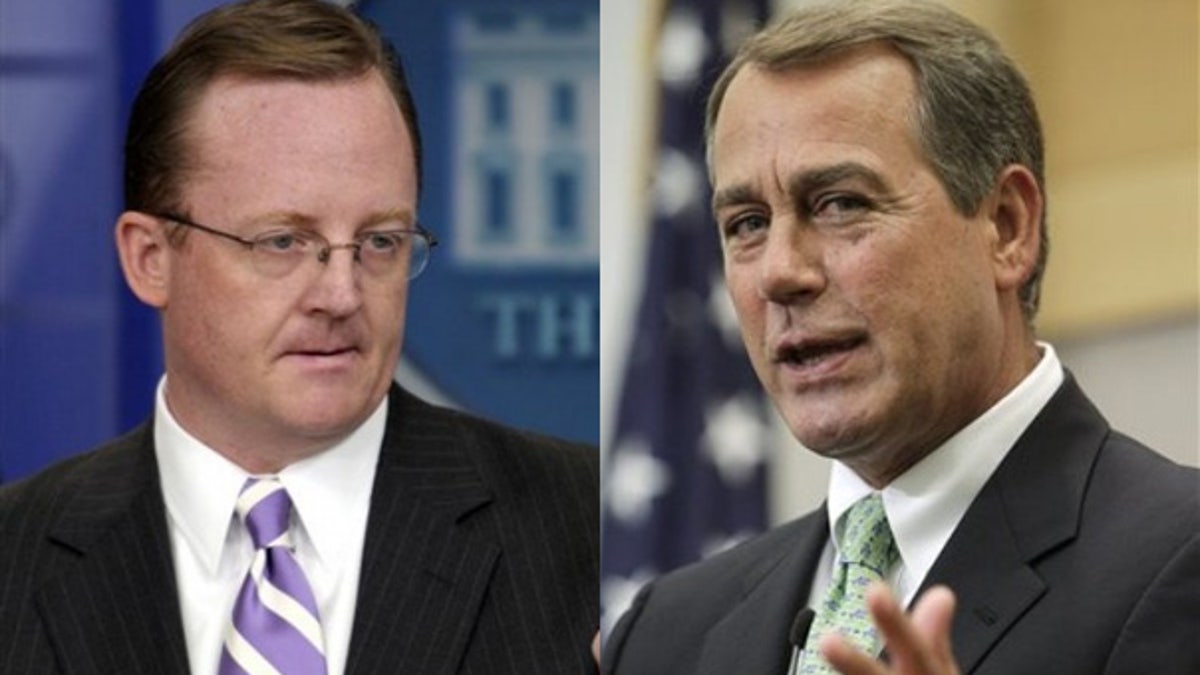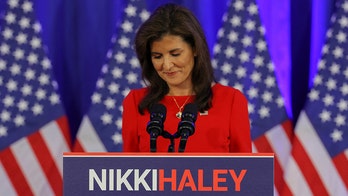
(AP)
With just 50 days to go until the midterm election, a 9.6 percent unemployment rate and polling favoring Republicans on nearly every measure, White House Press Secretary Robert Gibbs said Monday he wants to broaden the conversation away from President Obama's policies to what Republicans would do if they win back a congressional majority.
And in doing so, the administration is aiming point blank at House Minority Leader John Boehner, the man who would be speaker should the November election swing the balance of power away from the Democratic monopoly.
"He outlines an economic philosophy that sounds like a lot of what got us into this. The American people want to know who would be in charge of he House, who's leading the Republicans in this election season," Gibbs told NBC's "Today" show.
It's a risk to elevate Boehner to the president's stature in the national dialogue, especially since his name recognition doesn't come close to Obama's.
But the administration can't seem to help itself as polls show it may have everything to lose if it doesn't find a way to take the spotlight off an economy that just won't jumpstart -- in spite of nearly $1 trillion in new spending and billions more in new proposals on the table.
As a result, Obama has made it a point to travel to Ohio -- Boehner's backyard -- and has called him out by name eight times. The Democratic Congressional Campaign Committee has announced Sunday it would begin airing ads on Tuesday that refer specifically to the Republican leader.
Gibbs said the new strategy isn't aimed at Boehner specifically
"This isn't directed at the individual, it is directed at the ideas and it's directed at the values," Gibbs said.
But asked how it couldn't be a Boehner-specific strategy when his name is tossed all over the place, Gibbs acknowledged that he can't help but refer to the GOP leader.
"It'd be hard to just direct it at somebody out in the ether," Gibbs said.
Though Boehner isn't as high profile as his Democratic rivals, an NBC poll shows that Republicans win a solid majority of voters who say they trust the party to bring new ideas.
That's exactly what Gibbs is working to change.
"The best way you can know what Republicans are going to do in the future is to look what they've done in the past -- take us back to the policies that got us into this mess, cozy with lobbyists and tax cuts for the wealthy. That's not an economic plan for America's future," Gibbs said.
In the face of it all, Boehner isn't merely a wilting flower. On Sunday, he sparred with Gibbs on and off the air, calling it "bad policy" to exclude job-creating tax brackets. But he said if that's his only option for getting middle-class tax cuts passed, that's how he'd vote.
"But I'm going to do everything I can to fight to make sure that we extend the current tax rates for all Americans," Boehner told CBS' "Face the Nation."
On Monday, Treasury Secretary Tim Geithner said he was pleased by the remarks.
"We welcome recent indications that Republicans won't hold middle-class tax cuts hostage," Geithner said.
But Senate Minority Leader Mitch McConnell reportedly said that Senate Republicans have enough votes to block any measure that doesn't include tax cuts for high-income earners.
On Sunday, Gibbs responded to Boehner's comment by e-mail. "John Boehner's change in position and support for the middle class tax cuts, but time will tell if his actions will be anything but continued support for the failed policies that got us into this mess."'
He then posted a Twitter comment directing his followers to read a New York Times piece that dredges up a 1993 incident in which Boehner was handing out checks to lobbyists from the House floor. The action has since been outlawed, but Boehner's staff noted it was not prohibited at the time even if it may have been a bad idea.
A tweet on the Boehner's Twitter account followed Gibbs' tweet with a reminder about how administration officials were meeting with lobbyists at the coffee shop across from 1600 Pennsyvlania Avenue so as not to violate the letter of the president's pledge that lobbyists wouldn't be welcome in the White House.
Boehner followed that with a written statement suggesting the administration was engaging in "tired old class warfare rhetoric" and that the raising taxes in a struggling economy is a bad idea.
"If the president is serious about job creation, there's a clear way forward, and that's for us to come together and pass legislation immediately that cuts spending to 2008 levels for the next year and stops all of the coming tax hikes by freezing all current tax rates for the next two years," Boehner said
"Anything short of that may selfishly check a political box for the president, but it fails the American people."
The tax cuts issue is likely to dominate lawmakers' brief time back in Washington. Congress is only in town for about three or four weeks before adjourning to campaign ahead of the Nov. 2 midterm election.
When Congress gets back to work, the Senate will first take up the president's proposals for a series of business tax cuts. Obama has argued that Republicans would accept the cuts if it weren't election season, but several Republicans have said they oppose paying for tax cuts by raising other taxes.
Meanwhile, the administration will continue to challenge GOP calls for across-the-board cuts even as its own former budget chief said a two-year extension for everyone would be a good option in these slow economic times.
Congressional analysts say renewing the tax cuts for everyone would total $4 trillion over the next decade, of which $700 billion would go to couples making over $250,000 or singles making more than $200,000.
Council of Economic Advisers Chairman Austan Goolsbee told "Fox News Sunday" that the government can't afford to borrow $700 billion to give tax cuts to millionaires even as it's preparing to borrow the rest to pay for lower-end cuts.
Boehner argued that the $700 billion would go to the people who produce half of the nation's small business income.




